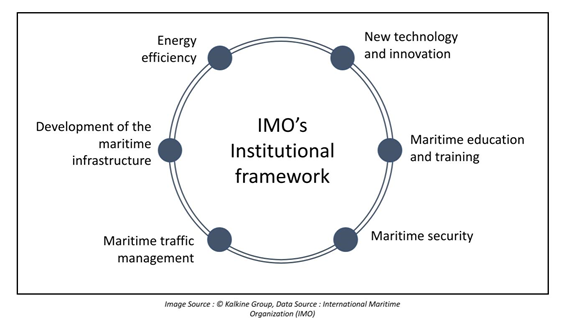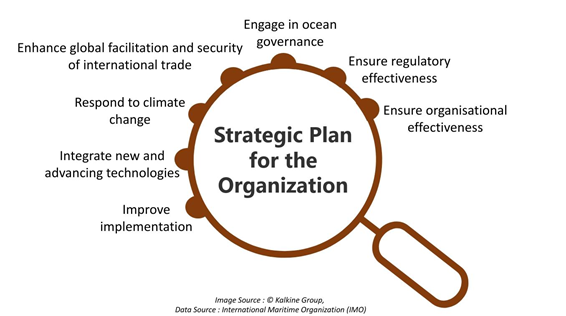International Maritime Organization
Updated on 2023-08-29T11:59:43.985935Z
What is the International Maritime Organization?
International Maritime Organization – IMO – is an agency specialised in dealing with maritime affairs. The primary responsibility of this United Nations agency is the safety and security of maritime mechanisms. The global standard-setting agency also works towards reducing marine and atmospheric pollution created by ships.
IMO, which was formerly known as Inter-governmental Maritime Consultative Organization, creates a regulatory framework for the shipping industry to function smoothly, fairly, and effectively.
The policies developed by the authority are internationally adopted and implemented, rather than individual countries implementing their own rules and regulations unilaterally.
The agency provides a transparent platform for the shipping industry to trade internationally in order to avoid taking steps which will lead to a compromise in safety, environmental and security performance for dealing with issues such as financial. Its policies hold shipping companies responsible, which fail to follow specific procedures and compromise on safety, security, and maritime environment.
With the help of new-age practices, IMO encourages innovation and efficiency in the international shipping industry.
Shipping industry is one of the most effective ways of increasing international trade. It helps
- In framing guidelines for a dependable and cost-effective way of transporting goods
- Facilitate Commerce
- Creates and maintains prosperity among people and Nations
These customs are agreed, adopted, and implemented by the entire industry and all shipping companies of all countries. The International Maritime Organization provides a platform for the processes to assemble and enforce.
Good Read: IMO MARPOL Convention To be Implemented Soon; Impact on Stakeholders and LNG Industry
How did IMO come into existence?
Currently, the international shipping industry contributes more than 80 per cent to trade transport to people and communities across the world.
Shipping has played an essential role in global trade for centuries in the past, and it also paved the way for globalisation across the world. Shipping goods through the sea is low in cost as compared to air and road transport. Many shipping nations developed and adopted international regulations and treaties to improve safety at sea in the past, especially from the mid-19th century. The countries then proposed for a global agency to be established to develop standard policies and treaties for the entire industry.
In 1948 an international conference in Geneva formally adopted and established IMO. Initially, the specialised agency was named as the Inter-Governmental Maritime Consultative Organization – IMCO, in 1982 it was changed to International Maritime Organization – IMO. Currently, the IMO is headquartered in London, United Kingdom.

Also read: Oil Search and Caltex Encountering Weaker Price Challenge Amid Market Disturbance from IMO 2020 and Coronavirus
What are the prominent roles and responsibilities of the IMO?
- Create a framework: A safe and efficient global shipping industry, not just provides a dependable and cost-effective mode of transport, but it also encourages trade among countries and people. The regulatory framework created and observed by IMO delivers the world a platform which is secure, economical.
- Implement the rules and regulations: International Maritime Organization has brought significant areas of concern under regulation. The policies have successfully prevented accidents in the past. It has set up safety and security practices which are followed by the members who deal in ships and other vessels.
IMO members also have to adhere to the treaties established to reduce pollution in the sea and other human disasters which are possible to avoid.
- Impose actions on the breach: IMO also provides a platform for the member nations to support each other in technical aspects. Most importantly, IMO have a set up to audition and monitor the customs and practices it has developed and impose compensations if anyone breaches these policies. Therefore, the International Maritime Organization plays a crucial role in the smooth functioning of the shipping industry.
How are the IMO handling environmental concerns?
The shipping industry is a vital element which connects the trade globally. Hence, it is important to focus on its sustainable economic growth. The member countries and overall shipping industry is working towards achieving the goal of a green economy through IMO.
Earlier the framework of IMO was primarily focused on the safety of the maritime trade but in the last few years, IMO is giving utmost priority towards the maritime environment.
The agency is promoting the growth and development of the shipping industry in a sustainable way.
IMO is a component of the United Nations. Currently, the agency is working on 2030 Agenda for Sustainable Development along with the associated SDGs. Sustainable Development Goals (SDGs) are the 17 goals developed by the United Nations to achieve a better and sustainable future. SGD 14 is the critical goal for IMO as it relates to the oceans goal; the agency will support a sustainable maritime transport industry.
The primary aim of the implementation of the UN policy is to build a healthy environment and facilitate world trade and the global economy.
IMO is committed to providing the institutional framework, which will lead the industry towards a green and sustainable international maritime transport system.
Do Read: IMO 2020- A Double Edge Gizmo for Woodside Petroleum and Caltex Australia

What is the future of the International Maritime Organization?
The International Maritime Organization was founded to provide necessary support and framework for smooth, safe, and efficient functioning of the shipping industry. It deals with all the technical matters which affect trade globally and bring robust practices in the industry.
From the last few years, IMO's major priorities have included the control of marine pollution produced by the shipping industry.
Because of IMO's framework and healthy implementation, the oil pollution of the sea has reduced substantially. The collisions between ships have lowered in number too as IMO has released traffic separation guidelines.
Read Blog: The Approaching Deadline Of IMO Emission Standards Caught The Energy Investors’ Eye